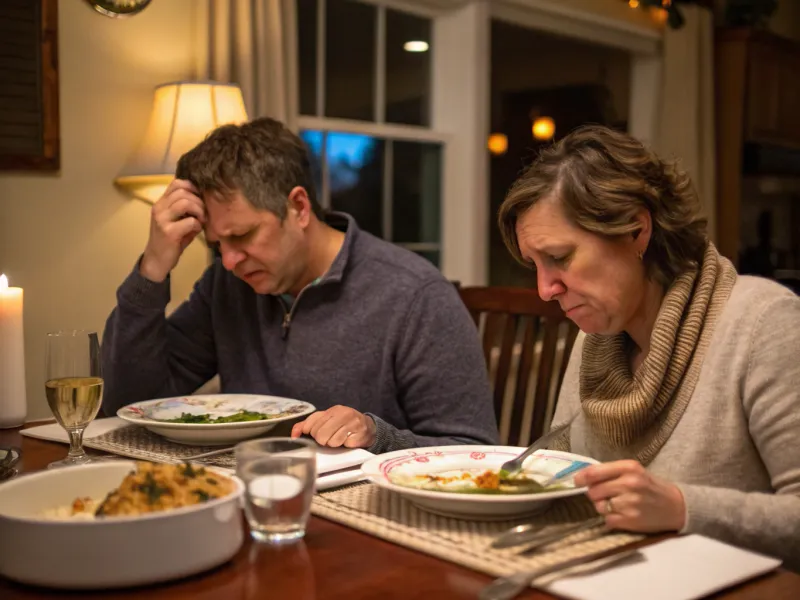27 Small Signs Your Relationship Is Way Too Negative
Ever find yourself wondering if your relationship has taken a detour to the negative zone? Sometimes, it’s the small signs that hint at the bigger picture.
Here are 27 little clues that might suggest your partnership needs a positivity boost. Remember, acknowledging these signs is the first step to turning things around.
1. Crítica constante

Criticism can be constructive, but when it feels like everything you do is wrong, it’s a red flag. If your partner nitpicks over small things, it’s time to pay attention. It might seem minor, like commenting on how you cook or dress, but it can erode self-esteem over time.
The constant barrage of negativity can feel overwhelming, leaving you questioning your every move. This isn’t just about bad habits; it’s about feeling unable to meet ever-changing expectations. The occasional critique is normal, but if it’s a daily occurrence, that’s a problem.
Feeling inadequate because of relentless criticism can breed resentment. It’s essential to communicate openly about how these comments affect you. Let your partner know that their words hurt and work together to create a more supportive environment.
2. Tratamientos silenciosos

Silent treatments can sting more than words. When communication stops, it feels like you’re being punished. It’s a way of controlling the narrative without saying anything.
This tactic can leave you feeling isolated and confused. You’re left to guess what went wrong and how to fix it, which is emotionally exhausting. It’s not just about giving space; it’s about using silence as a weapon.
Healthy relationships thrive on open communication. If silence becomes a regular part of disagreements, it might be time to reassess. Expressing feelings, even when they’re uncomfortable, is crucial. Encourage dialogue by reassuring your partner that you’re there to listen without judgment.
3. Celos por pequeñeces

Jealousy in small doses can be normal, but when it flares up over trivial matters, it’s concerning. If your partner is constantly checking your phone or questioning your whereabouts, it could indicate deeper trust issues.
This behavior can make you feel like you’re walking on eggshells, anxious that any interaction might trigger suspicion. It’s not healthy to feel monitored all the time.
Aborda este tema manteniendo una conversación sincera sobre la confianza. Explícale cómo te hacen sentir estas acciones y trabaja para establecer límites. La confianza es fundamental y, sin ella, las relaciones no crecen.
4. Marcador

Controlar quién ha hecho qué puede convertir el amor en una competición. Si cada acción se pesa y se mide, puede crearse una dinámica de ojo por ojo.
This approach fosters resentment rather than appreciation. Instead of celebrating each other’s efforts, you’re busy tallying up who owes whom. It’s exhausting and unnecessary.
Focus on appreciating acts of kindness without expecting something in return. Love shouldn’t be about keeping score, but about mutual support. Talk about how this behavior affects your sense of partnership and work towards a more balanced relationship.
5. Falta de aprecio

Feeling taken for granted can be disheartening. If your efforts go unnoticed, it might feel like you’re invisible. Everyone deserves to feel appreciated, even for the little things.
When thanks become rare, resentment can brew. You might start questioning your role and worth in the relationship. It’s important to express gratitude and acknowledge each other’s contributions.
Hable abiertamente de cómo se siente. Fomente la expresión de gratitud, incluso por las acciones cotidianas. Un simple "gracias" puede contribuir mucho a crear un ambiente positivo.
6. Discusiones frecuentes

Todo el mundo discute, pero las disputas frecuentes e intensas pueden indicar problemas subyacentes. Los desacuerdos habituales pueden indicar tensiones no resueltas.
Constant conflict can be draining and damaging. It leaves both parties feeling unheard and frustrated. This isn’t just about differing opinions; it’s about the inability to reach common ground.
Intente identificar las causas profundas y abordarlas juntos. Céntrese en técnicas de comunicación que promuevan la comprensión en lugar de la culpa. Las relaciones florecen cuando ambas partes se sienten escuchadas y valoradas.
7. Evitarse mutuamente

Avoidance can be an indicator of deeper problems. If you’re both spending more time apart, it might signal discomfort or disinterest.
Distance can grow when issues are ignored or brushed aside. This behavior might stem from not wanting to confront what’s wrong, but it only makes things worse.
It’s crucial to acknowledge the space and work on bridging it. Initiate honest conversations about feelings and concerns. Reconnecting requires effort and willingness to face challenges together.
8. Hablar negativamente sobre el futuro

Pessimistic discussions about the future can dampen excitement. If planning ahead feels more like a chore than a joy, something might be off.
Negative outlooks can create uncertainty. It might signal doubts about the relationship’s longevity or compatibility. It’s important to share hopes and dreams, not just fears and doubts.
Las conversaciones sobre el futuro deben inspirar y motivar. Encuentren formas de alinear sus visiones y crear juntos objetivos positivos. Trabajar por un sueño común refuerza los lazos.
9. Exclusión de actividades sociales

Sentirse excluido de los planes sociales puede ser doloroso. Si tu pareja te excluye con frecuencia de las reuniones, puede ser un signo de desconexión.
La exclusión social puede hacerte sentir indeseado o poco importante. Plantea dudas sobre el lugar que ocupas en su vida y puede provocar sentimientos de soledad.
Hable de cómo le afecta este comportamiento y explore formas de ser más integrador. Las relaciones prosperan gracias a las experiencias compartidas y al apoyo mutuo.
10. Falta de apoyo emocional

Emotional support is vital for any relationship. If your partner dismisses or ignores your feelings, it can create a void.
Sentirse sin apoyo puede llevar al aislamiento y la frustración. Te mereces que validen tus sentimientos y que tu pareja esté a tu lado en los momentos difíciles.
Fomente conversaciones abiertas sobre las necesidades emocionales. Expresa cómo es el apoyo para ti y trabaja para fomentar un entorno enriquecedor.
11. Negatividad constante

Constant negativity can cloud a relationship. If everything feels negative or there’s always a problem, it can weigh heavily on both partners.
Negativity can stem from stress, dissatisfaction, or unresolved issues. It’s crucial to identify the root causes and address them together.
Cambia el enfoque hacia la positividad celebrando las pequeñas victorias y practicando la gratitud. Anímense mutuamente a ver el lado positivo de las cosas y apóyense en los retos.
12. Falta de compromiso

El compromiso es clave para el éxito de cualquier relación. Si una persona siempre se sale con la suya, puede surgir el resentimiento.
Sentirse desoído o ceder constantemente puede conducir a la frustración. Las relaciones requieren dar y recibir, y encontrar un equilibrio es esencial.
Discuss the importance of compromise and work towards solutions that satisfy both parties. It’s about partnership, not one-sided decisions.
13. 13. Comportamiento irrespetuoso

Disrespect can manifest in various ways, from dismissive comments to belittling actions. If disrespect becomes a norm, it’s concerning.
Feeling belittled or mocked can erode self-esteem and damage trust. It’s crucial to address these behaviors early on.
Fomentar interacciones respetuosas estableciendo límites y expectativas claros. Anímense mutuamente a comunicarse con amabilidad y comprensión.
14. Ignorar los límites

Los límites son cruciales en cualquier relación. Ignorarlos puede generar malestar y resentimiento.
Feeling like your boundaries aren’t respected can make you feel violated and unheard. It’s important to communicate what feels acceptable and what doesn’t.
Work on establishing and respecting each other’s boundaries. It’s about mutual respect and understanding of personal space and limits.
15. Falta de confianza

La confianza es fundamental en las relaciones. Si los problemas de confianza persisten, pueden crear una barrera entre los miembros de la pareja.
Constant doubts or suspicion can lead to anxiety and insecurity. Trust is built through honesty and transparency, and without it, relationships struggle.
Hable abiertamente de la confianza y aborde los problemas subyacentes. Trabaja para restablecer la confianza mediante acciones coherentes y una comunicación abierta.
16. Manipulación emocional

Emotional manipulation can be subtle but damaging. If your partner often plays the victim or twists situations for sympathy, it’s a red flag.
This behavior can make you feel guilty or responsible for their emotions. It’s important to recognize these tactics and assert your feelings.
Address manipulation by setting boundaries and communicating openly. Encourage healthy, honest interactions that respect each other’s emotions.
17. Evitar conversaciones importantes

Las conversaciones difíciles son necesarias para crecer. Si se evitan sistemáticamente temas importantes, se puede obstaculizar el progreso.
La evitación puede deberse al miedo al conflicto o a la incomodidad, pero deja cuestiones sin resolver. Esto puede generar frustración y malentendidos.
Fomente el diálogo abierto creando un espacio seguro para conversaciones sinceras. Abordar temas difíciles fortalece las relaciones y fomenta el entendimiento.
18. Falta de intimidad

La intimidad es un componente clave de las relaciones sentimentales. La falta de intimidad puede indicar problemas más profundos o un distanciamiento.
La intimidad física y emocional van de la mano. Sin ella, la pareja puede sentirse desconectada e insatisfecha.
Discuss what intimacy means to each of you and work on rekindling that connection. It’s about creating closeness and understanding each other’s needs.
19. Comportamiento de control excesivo

Control can manifest subtly or overtly. If your partner dictates every aspect of your life, it could be a sign of imbalance.
Feeling controlled can lead to resentment and a loss of individuality. It’s important to maintain autonomy in a relationship.
Hable de la necesidad de independencia y trabaje para crear una dinámica equilibrada en la que ambos miembros de la pareja se sientan capacitados y respetados.
20. Falta de intereses compartidos

Los intereses compartidos son importantes para la conexión. La falta de ellos puede provocar sentimientos de separación o aburrimiento.
While it’s normal to have separate hobbies, finding common ground is vital for bonding. Shared activities create memories and strengthen relationships.
Explore new interests together and find activities that you both enjoy. It’s about creating shared experiences and finding joy in each other’s company.
21. Cuestiones del pasado no resueltas

Past issues that linger can cast a shadow on the present. If unresolved problems keep resurfacing, it’s time to address them.
Ignorar los conflictos del pasado puede impedir la curación y el progreso. Puede parecer más fácil evitarlo, pero sólo crea más tensión.
Resuelve los problemas del pasado manteniendo conversaciones abiertas y sinceras. El cierre es clave para avanzar y crear una dinámica más sana.
22. Ultimátums frecuentes

Los ultimátums pueden parecer amenazas. Si tu pareja los da con frecuencia, puede indicar un desequilibrio de poder.
Sentirse presionado para cumplir o no puede generar resentimiento y miedo. Las relaciones deben basarse en el respeto mutuo, no en la coacción.
Discuss the impact of ultimatums and work on finding collaborative solutions. It’s about creating a supportive environment where both partners feel valued.
23. Crítica pública

Criticism is hard enough in private, but when it’s public, it can be humiliating. If your partner frequently criticizes you in front of others, it’s a concern.
Las críticas públicas pueden dañar la autoestima y la confianza. Puede hacerte sentir expuesto y sin apoyo.
Aborde este comportamiento estableciendo límites claros y hablando de cómo le afecta. Fomenta las conversaciones privadas sobre temas delicados.
24. Juego de culpas

Blaming each other for everything is a toxic cycle. If this is a common theme, it’s time to reassess.
La culpa constante puede crear un ambiente hostil en el que ninguno de los dos se sienta apoyado. Desvía la responsabilidad e impide el crecimiento.
Céntrese en encontrar soluciones en lugar de culpar a los demás. Fomente el trabajo en equipo y el entendimiento para resolver juntos los conflictos.
25. Evitar conflictos

Avoiding conflict might seem like a way to keep the peace, but it often leads to unresolved issues piling up. In relationships where negativity prevails, partners might choose to ignore problems rather than confront them, hoping they’ll disappear on their own.
Esta evasión puede crear una falsa sensación de armonía mientras se enconan los problemas subyacentes. Con el tiempo, el cúmulo de preocupaciones sin resolver puede resultar abrumador y dificultar el diálogo productivo cuando es necesario.
26. Walking on Eggshells

A healthy relationship should feel like a safe space, not a minefield. If you constantly censor yourself or second-guess your words to avoid upsetting your partner, it’s a sign that something is off.
Walking on eggshells creates a tense atmosphere, making open and honest communication nearly impossible. You might find yourself avoiding certain topics or altering your behavior just to keep the peace, which can be exhausting and emotionally draining.
No one should feel afraid to express their thoughts and feelings in a relationship. If this is a pattern, have a discussion about creating a space where both of you can speak openly without fear of backlash or hostility.
27. Feeling More Alone Than Together

Loneliness in a relationship can be even more painful than being alone. If you feel emotionally disconnected from your partner—even when you’re in the same room—it could mean your relationship has lost its sense of closeness and support.
This might manifest as a lack of meaningful conversations, decreased affection, or a general feeling that you’re not truly seen or heard. Over time, this emotional distance can make the relationship feel more like an obligation than a partnership.
Address this by prioritizing quality time together. Express how you feel and see if you can reignite the connection by being more present, engaging in shared activities, and openly communicating your needs.







